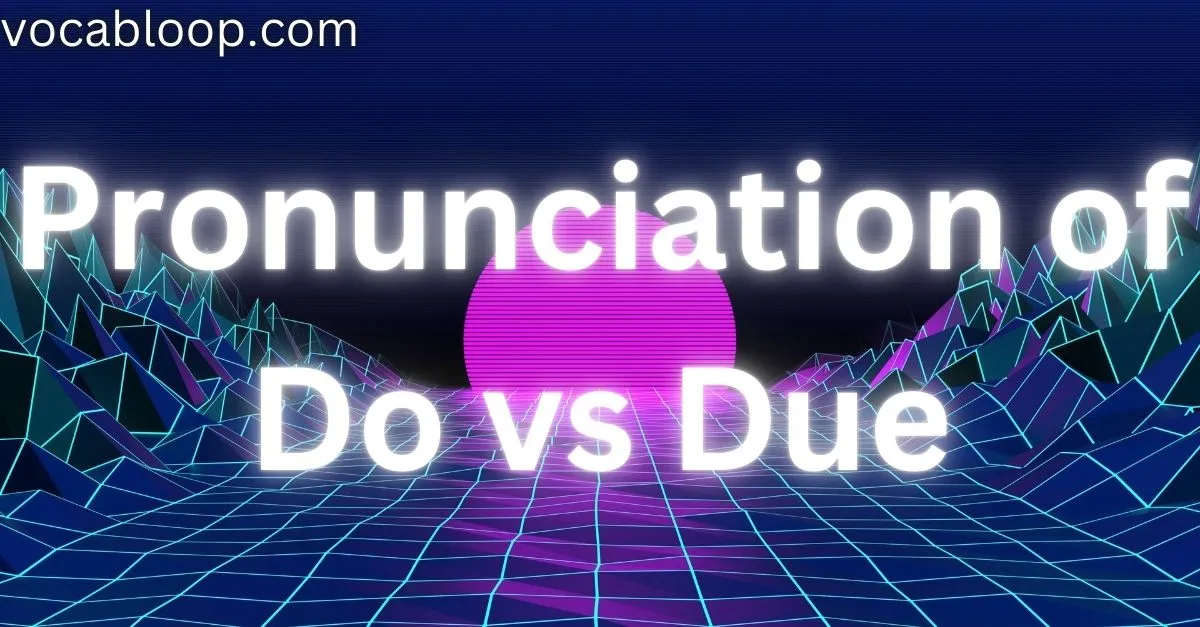The English language is full of commonly confused words, and “do” vs “due” are no exception. While they sound similar, their meanings and functions are entirely distinct. “Do” is a versatile verb, used to describe actions, tasks, or commands, such as “Do your homework.” On the other hand, “due” refers to something expected, owed, or scheduled, like “The bill is due tomorrow.”
These differences may seem simple, but they can lead to errors without a clear understanding. In this article, we’ll explore the definitions, meanings, and correct usage of these terms, helping you master their roles in English grammar and avoid common mistakes in your writing.
What Is the Confusion: Do vs Due?
The confusion between do and due stems from their identical pronunciation in American English. Both words have distinct meanings and belong to different grammar components. “Do” is a versatile verb used in many contexts to perform actions, while “due” is typically an adjective describing something expected or owed, like a deadline obligation.
Understanding the accurate application of these words requires attention to their role in a sentence. Sentence structure and context clues are essential when choosing the correct word, as each plays a unique part in the syntax of a phrase.
What’s the Do?

The word “do” is a foundational element of English, widely used in both spoken and written language. It serves multiple purposes and is recognized as one of the most adaptable verbs in the language.
Is the Word Do Correct?
The word “do” is not just correct but essential in English grammar. It appears in countless contexts, making it a reliable choice for expressing actions, forming questions, and emphasizing statements. Its widespread usage makes it indispensable for everyday communication.
Definition
“Do” is defined as “to perform, execute, or accomplish something.” It can act as the main verb in a sentence or as an auxiliary (helping) verb. Its versatility allows it to express a variety of actions or serve structural purposes in sentences.
Meaning
The meaning of “do” depends on its context. It can represent actions (“I do my work daily”), form emphatic statements (“I do know the answer”), or introduce questions and negatives (“Do you agree?” or “I do not like that”). This broad applicability makes it a multifunctional verb that simplifies communication.
Usage
“Do” can stand alone or accompany other verbs to complete meaning. It features in imperative sentences, such as “Do your best” or “Do not enter.” Additionally, it is a vital part of grammar rules, often helping to form interrogative and negative sentences. Its ability to convey actions and add emphasis ensures its place as a key linguistic tool in English.
What Is Due?

The word “due” is equally significant in English, primarily functioning as an adjective but also appearing as a noun or adverb in specific contexts. It conveys a sense of obligation or expectation.
Is the Due Word Correct?
Yes, “due” is correct and highly relevant in English usage. It is often used to describe deadline obligations or anything that is expected or owed. Its role in financial and descriptive contexts makes it essential for expressing time-sensitive or qualitative matters.
Definition
“Due” refers to something that is scheduled, expected, or required. It is most commonly used to denote owed responsibilities, such as payments, deadlines, or recognition.
Meaning
The word “due” emphasizes responsibilities or time-sensitive tasks. For instance, “The bill is due tomorrow” refers to a payment deadline, while “She is due respect” highlights owed obligations. This clear focus on obligations ensures its frequent use in professional, academic, and everyday scenarios.
Usage
“Due” is often linked to obligations and expectations. It frequently appears in sentences like “Credit is due to the hardworking team” or “This report is due by Friday.” Its use transcends financial contexts, appearing in descriptions of qualities or conditions where recognition or time is critical.
Quick Summary of Do vs Due
| Word | Part of Speech | Meaning | Usage Example |
| Do | Verb | To perform or execute an action | “I do my homework daily.” |
| Due | Adjective | Something owed or expected | “The assignment is due tomorrow.” |
Do vs Due as Parts of Speech
“Do” is a flexible verb, commonly used to take action, form questions, and structure sentences. Its auxiliary function helps in creating negatives and interrogatives, such as “Do you know him?” or “I do not agree.”
Conversely, “due” serves as an adjective to describe owed responsibilities or set expectations, such as in “The payment is due today.” Its focus on describing conditions makes it a valuable descriptive tool. Both rely on contextual clues to convey their intended meaning accurately.
Pronunciation of Do vs Due

In American English, “do” and “due” often sound the same, creating confusion. However, British English pronunciation distinguishes them more clearly.
“Due” is pronounced with a “y” sound, making it resemble “dew,” while “do” retains its straightforward pronunciation.
Side-by-Side Comparison: Do vs Due
| Feature | Do | Due |
| Part of Speech | Verb | Adjective |
| Function | Perform or execute actions | Owed or expected obligations |
| Example Usage | “Do your best.” | “The payment is due today.” |
Which One Is More Acceptable: Do vs Due?
Both “do” and “due” are commonly used and correct, but their acceptance depends entirely on the context in which they appear. If you’re discussing actions or commands, “do” is your go-to word. For example, “Please do your chores” is a clear instruction for performing tasks. Conversely, when referring to owed responsibilities or deadlines, “due” is appropriate, as in “Your report is due tomorrow.”
Understanding their contextual roles ensures proper usage. While “do” dominates conversations involving actions and execution, “due” finds its place in discussions about expectations and obligations. Both words are integral to effective communication, especially in English grammar.
Do in British English and American English

The word “do” shows minimal variation between British English and American English. It consistently functions as a versatile verb, helping form questions like “Do you agree?” and negatives such as “I do not know.” Its pronunciation and application remain uniform, contributing to its simplicity and widespread use.
One minor difference lies in colloquial expressions. In British English, “do” may appear in phrases like “I’ll do the washing up,” while American English prefers “I’ll do the dishes.” These differences, however, are slight and do not affect the grammar rules surrounding “do.”
Due in British English and American English

“Due,” on the other hand, presents slight differences in pronunciation between British and American English. In British English, it often includes a “y” sound, making it similar to “dew.” American English, however, pronounces it more like “doo.” Despite this difference, its meaning and use remain consistent.
Whether describing payment deadlines, expected obligations, or owed responsibilities, “due” serves the same purpose on both sides of the Atlantic. Its universal appeal lies in its clear indication of something that must happen within a specific timeframe, ensuring clarity in both formal and informal settings.
Common Mistakes and How to Avoid Them
One frequent mistake involves confusing “do” and “due” due to their similar sounds, especially in American English. Writers might accidentally use “do” in place of “due” or vice versa, leading to unclear sentences. For instance, “The bill is done tomorrow” is incorrect; the correct sentence is “The bill is due tomorrow.”
To avoid such errors, focus on the parts of speech and the sentence’s context. If you’re describing actions or execution, use “do.” For obligations or deadlines, choose “due.” Using grammar tools or proofreading your work can further help eliminate mistakes. These tools can identify contextual issues, ensuring accurate application.
Trick to Remember the Difference: Do vs Due
A simple trick to distinguish these words is to connect “do” with action and “due” with deadlines. Think of this sentence: “Do your task before it’s due.” This phrase neatly illustrates their meanings and helps reinforce proper usage.
Another helpful mnemonic is to associate “do” with the act of doing, like carrying out tasks or taking action, while “due” should remind you of “owed” or “expected,” as in time-sensitive tasks. Practicing sentence examples and exploring their applications in real-world contexts can make this distinction second nature.
Origins of Do vs Due

The origins of “do” and “due” highlight their rich linguistic histories. “Do” derives from Old English “dōn,” meaning “to perform” or “to accomplish.” Its roots trace back to Proto-Germanic “dōną,” which also influenced other Germanic languages. Over time, “do” evolved into one of the most versatile verbs, used in commands, questions, and auxiliary forms in modern English.
On the other hand, “due” comes from the Latin word “debitus,” meaning “owed.” This term originally referred to debts or obligations in financial contexts. Through Old French, it entered English, expanding to describe anything expected, scheduled, or fitting. Today, “due” carries broader meanings, from describing deadline obligations to indicating expected responsibilities. These distinct etymologies reflect their different roles in English, even as their spellings and pronunciations create confusion.
Synonyms of Do vs Due
Do:
- Perform
- Execute
- Complete
- Accomplish
- Carry out
- Act
- Manage
- Operate
- Handle
- Achieve
Due:
- Owed
- Expected
- Scheduled
- Obligatory
- Payable
- Pending
- Forthcoming
- Required
- Anticipated
- Approaching
Sentences in Daily Usage of Do vs Due

Do:
- I do my homework every evening.
- Please do the dishes after dinner.
- They always do their best.
- Do you agree with the plan?
- I can do that for you.
- She does her job perfectly.
- Let’s do something fun today.
- Can you do this for me?
- He doesn’t do his chores.
- I need to do better next time.
Due:
- The bill is due tomorrow.
- Her respect is long due.
- The project is due next week.
- This payment is past due.
- Credit is due to the hardworking team.
- The train is due to arrive at noon.
- Your rent is due today.
- Recognition is due to those who helped.
- Taxes are due in April.
- The report is due by Friday.
FAQs
What is the main difference between “do” and “due”?
“Do” is a verb for actions, while “due” is an adjective for expectations or obligations.
Can “do” and “due” be used interchangeably?
No, they have distinct meanings and should not be swapped.
Why are “do” and “due” confusing?
They sound similar, especially in American English, but have different roles in sentences.
Is “do” more common than “due”?
Yes, “do” appears more often due to its role as a common verb.
How can I learn to use “do” and “due” correctly?
Practice with sample sentences and use grammar correction tools.
Conclusion
Understanding the differences between “do” and “due” can enhance your vocabulary skills and improve your grammar basics. These two words play vital roles in English, with “do” emphasizing actions and “due” focusing on obligations.
Mastering their usage will not only help you avoid mistakes but also elevate your writing tips and overall communication.

Alex Hormozi is a seasoned blogger at Vocab Loop, known for his deep insights into language, vocabulary, and grammar. With years of experience in writing, Alex shares practical tips and effective strategies to help readers improve their linguistic skills and enhance their writing abilities.

